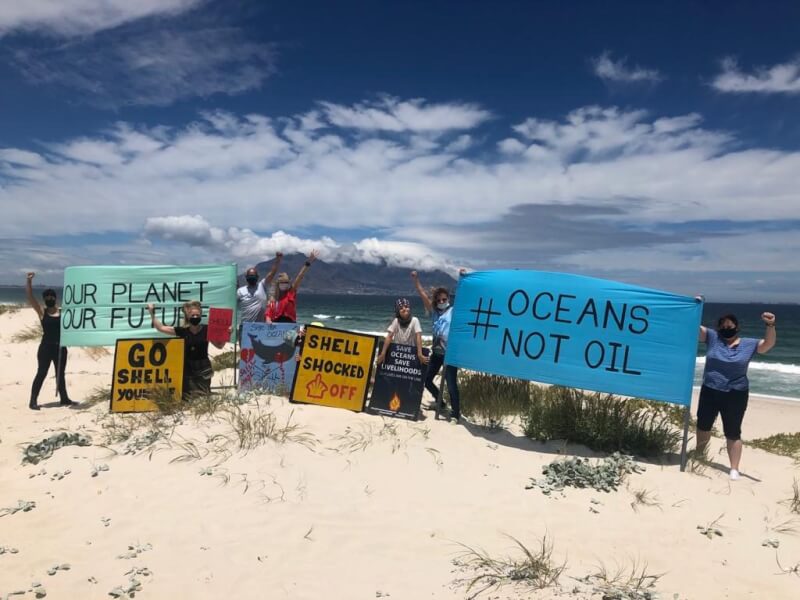15 December 2021 – Last month world leaders met to discuss the issue of climate change, and we saw agreement at the UN Climate talks to move towards greener energy sources. There was consensus that urgent action is needed now to avoid passing irreversible tipping points and if we have any chance of limiting temperature rise to 1.5 degrees. However, despite the calls for a ‘phase-out’ of fossil fuels and perverse subsidies, and global recognition that they are a major contributor to global warming new projects are still being funded.
As of 1 December 2021, Shell was due to commence an oil finding expedition in the form of seismic blasting along South Africa’s Wild Coast. Not only is this completely perverse considering we know that oil must be on its way out to meet global climate goals, but the process in which the exploration will occur will also cause environmental devastation in terms of degradation of the ocean and is creating social upheaval for the local community impacted.
The rights for this exploration were derived from an agreement in 2014 under very questionable circumstances. Since then science has shown the devasting impacts of both our continued use of dirty fuels, and the damaging ecological side effects of our pursuits to find more. In 2015, 175 parties signed the Paris Agreement – a global framework to avoid dangerous climate change by limiting global warming to well below 2°C. In 2020, the Club of Rome published the Planetary Emergency Plan. The Plan clearly states the actions and urgency needed to emerge from emergency and to stay within the planetary boundaries. It specifies the 10 commitments needed to preserve the global commons and 10 actions to create just and equitable societies; transform energy systems; and shift to a circular and regenerative economy. This included the call to stop all fossil fuel expansion, production and use by halting subsidies and shifting revenues and investment to low-carbon deployment by 2025.
This year the Intergovernmental Panel on Climate Change Sixth Assessment Report stated that unless there are immediate, rapid and large-scale reductions in greenhouse gas emissions, limiting warming to close to 1.5°C or even 2°C will be beyond reach. The recent International Energy Agency Net Zero scenario says that as from 2021, there should be no new oil and gas exploration projects globally to stay within a 1.5°C average global temperature scenario.
Despite this international recognition and scientific consensus, why is it that Shell and South Africa are allowing this destruction to continue?
Why is profit and short-term gain put before the survival of humanity? And it is not only our own survival we endanger, but those of other species we share this planet with.
The Eastern estuaries and coasts of South Africa are highly prized globally as they provide habitat to many species of marine mammals (blue, mink, humpbacked and Southern Right whales), some of which are already endangered – such as the Pygmy Blue Whale. The dolphins are highly important in these delicate food webs such as the Bottlenose, Humpback, and Long-beaked common dolphins.
The three-dimensional (3D) offshore seismic survey from Morgan Bay to Port St Johns will be conducted by a Norwegian company, Shearwater GeoServices, who are to map out any potential deposits of oil and gas. The research vessel, Amazon Warrior, uses military-grade seismic cannons to fire loud shock-wave emissions every 10 seconds, 24 hours a day for five months – before moving to the Eastern Cape where blasting will continue for another five months from Gqeberha to Plettenburg Bay.
There is no evidence that blasting or other acoustic and sonar technologies does not cause damage, confusion, or even death to ocean wildlife. This is especially true of the marine mammals’ fragile calves bred along the East Coast. Key endangered species likely to be impacted are The Pygmy Blue Whale, the Blue Crane and African Penguin.
A new world heritage site in Natal has recently been formed which has a 200 mi. area of marine turtle procreation. Although turtle nesting occurs on the beach, far from the blasting, the turtles would be greatly affected by the risks of any oil spill during the initial or later production period. The turtles – which are endangered – nest above the intertidal zone, which can be highly impacted by any contaminants such as oil or any other chemicals used during the blasting.
In addition, the vessels and sonar and acoustic activities could potentially damage schools of fish of economic value to South Africa, and coastal communities who are dependent on the ocean for survival through either fishing or tourism.
What is the point of exploring for oil if fossil energy is both on its way out and the consequences of the oil being extracted are so severe that irreparable harm will be made to the surrounding ecosystem? How can South Africa allow this to happen? This exploration is only phase I. The subsequent phases are potentially even more polluting, so why would any sane government not think about the long-term impacts?
Massive and accidental oil spills during early exploratory drilling can badly impact all marine mammals directly and indirectly particularly their calving grounds’, as well as surrounding plants and animals, necessary for the proper development of young calves. At a minimum, this can also kill tourism and fisheries for several seasons and destroy local ecosystems along the eastern coast.
Drilling, extraction and production will require massive on shore facilities to refine, to provision offshore rigs, to deal with oil tankers coming in and out to haul the fossil fuel. Each step has its own impact and high risk of spills especially during the storm season.
The planned exploration will cause desecration and destruction of ancestral lands of communities that depend on land for their livelihoods and cultural rites. These communities have joined thousands of other South African citizens in protest along the coasts of South Africa. While we have been heartened to see the mass public movement within South Africa, we call on the South African Government to take action to stop this atrocity before further damage occurs. The exploration for fossil fuels – proven to be a major contributor to climate change – is completely irresponsible.






